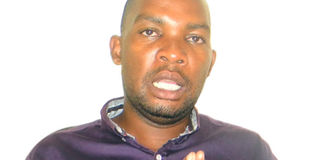Women not keen on internal ailments

Richard Kimbowa, the spokesperson of Uganda Herbalists and Cultural Association. Photo by Godfrey Lugaaju
Tell us something brief about yourself
I am Richard Kimbowa, aka Kojja Kimbowa, a 37-year-old businessman, herbalist and spokesperson of the body that unites all herbalists in Uganda.
What does your job as spokesperson entail?
I speak for all herbalists, letting people know the number of herbalists in Uganda and the research we carry out on different diseases. I also advocate for embracing local medicine, telling people its advantages as opposed to factory-made medicines. I also check and monitor the activities of herbalists as a way of weeding out quacks.
How long have you been doing this?
Three years.
What impact have you had in this period?
I can happily tell you that the public’s perception and attitudes towards local medicine has changed. They appreciate the fact that even the medicine dispensed in hospitals is made from herbs, but they need to use fresh herbs. As an organisation, we have done a lot but there are still some loopholes here and there.
What are these loopholes?
Our drugs are good and a big percentage of Ugandans can testify to this, but we still lack equipment and preservatives to make them better. We also lack a quality checking system for herbs. We have outlined our problems to the government and we hope for a positive response.
What else do you do apart from speaking for the organisation?
I am a marriage counsellor, an experienced researcher in diseases that affect women and an educationist with two schools (St Elvis Junior School and Modern Alliance S.S), both in Mityana.
What do you do in regard to women’s health?
I studied and researched a lot about women’s health. I am skilled in treating candida, urinary tract infections, and many other diseases that would prevent a woman from giving birth. I pursued a course in Botswana in 2001 with the help of the Ugandan government sponsorship in the Programme for Enhancing Adolescent Reproductive Life (PEARL) under the Ministry of Gender, Labour and Social Development. I have been at the forefront of dealing with women reproductive health issues.
What are some of the recurrent health issues affecting women?
Women are reluctant when it comess to their health thus their issues are incessant. They react a lot to various medications, environments and other factors. In most cases, they tend to undermine the diseases that are not on the outer part of thier bodies and become reluctant to treat them, which puts their lives in danger. I believe they need to be more concerned about internal ailments just as they would be about the visible ailments.
What are some of the challenges in marriages today?
Women tend to draw their attention away from the important basics that would make a man happy, under the guise of being busy. This is the core reason why marriages are falling apart. The men also at some point draw their attention away from their wives after getting married to them. This also wrecks marriages.
What is your remedy to this?
We ask both men and women to appreciate that the challenges they face in marriage are just shortcomings; better times are yet to come.
What does it take to be a good marriage counsellor?
You need to be open minded, outspoken, approachable and friendly. There is history attached to my being a marriage counsellor. My father, Mr Godfrey Lutaaya, is a renowned marriage counsellor who everyone consulted in Mityana District in the past. Growing up, we were taught the principles of humanity and life values and these have helped me for the last 17 years I have been in the field.
Tell me about your family. Are you married?
Yes. I am married and I have six children. I value my marriage a lot.
Which schools did you attend?
I went to Feja Primary School in Mityana, Singo S.S Mityana for my O and A level, and Buganda Royal Institute where I studied a diploma in business administration.
Quick bits
What do you have to say about the current shift of Kojjas and Ssengas from those with blood ties to those hired to do counselling?
Many do not value their titles and some actually do not know what to do. Most of the ssengas and kojjas with blood ties have never experienced what they need to talk about with the brides and bridegrooms. So, we find most of the services today done by hired ones.
I believe the trend has done more harm than good for today’s marriages.
So, are the hired Kojjas and Ssengas also responsible for marital problems?
Yes, to some extent. The bride and groom invite us a few days to their wedding for a day to talk about things that should have been started years back. Ideally, you cannot expect us to expound on all these things in just a few hours so we will deliver but not as a ssenga and kojja who have been living with the bride and groom and have blood ties would.




